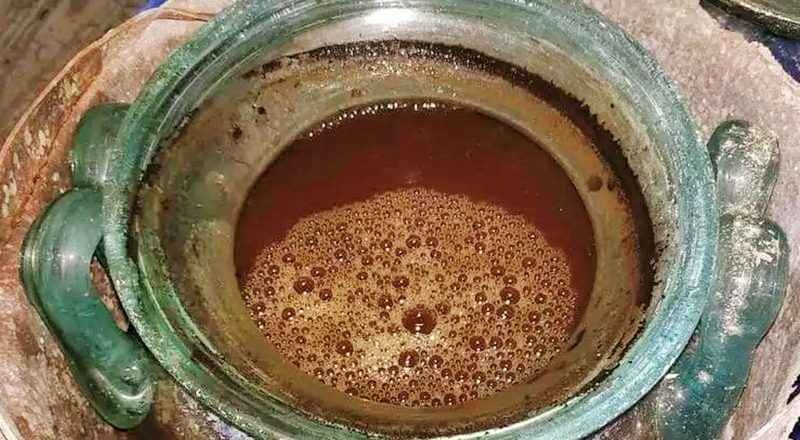ARCHAEOLOGISTS found the world’s oldest bottle of wine was filled with the ghastly remains of a first century man and his gold.
The 2,000-year-old glass urn was found in a roman tomb in the Carmona of city in Spain’s Andalusia region.
It was initially found by experts five years ago and earlier this year they confirmed the liquid inside the container was wine.
The man’s cremated remains were found along with the vintage wine which also contained a gold ring, presumed to be his, with the image of the Roman god Janus emblazoned on it.
The urn – named Olla Ossuaria was full to the brim with around five litres of the preserved reddish liquid.
The wine urn also contained three amber jewels, a bottle of patchouli-scented perfume and some silk fabric.
A local homeowner who was doing renovation work came across the wine by chance back in 2019 and told the local archaeology board.
Chemist Ruiz Arrebola from University of Cordoba told Discover Magazine: “A key factor in the discovery was that the tomb had not been looted or altered previously.
“This means it remained sealed for nearly 2,000 years.”
Researchers said in a journal: “The liquid could not have reached the inside of the urn through flooding or leakage in the burial chamber, nor through condensation.
“This is especially likely as the inside of the urn in the adjacent niche, L-7, was under identical environmental conditions but completely dry.”
The team, at the University of Cordoba were not surprised that the old remains they uncovered were a man’s as the Romans didn’t let women drink wine.
Another urn in the tomb contained a woman’s remains without any traces of wine, confirming this theory.
It’s thought that adding artefacts like gold into tombs was a typical Roman funeral ritual done so the dead could use them in the afterlife.
Testing showed that the vintage wine dated back to the fourth century, making it the world’s oldest known wine.
Local archaeologist Juan Manuel Román said: “At first we were very surprised that liquid was preserved in one of the urns.”
His team found a total of eight different niches in the tomb and six had urns containing the remains of three men and three women.
They suspect the tomb site was a family mausoleum belonging to Carmo locals at the time, reports Decanter.
The sealed burial chamber had been untouched for 2,000 years and remained largely intact.




